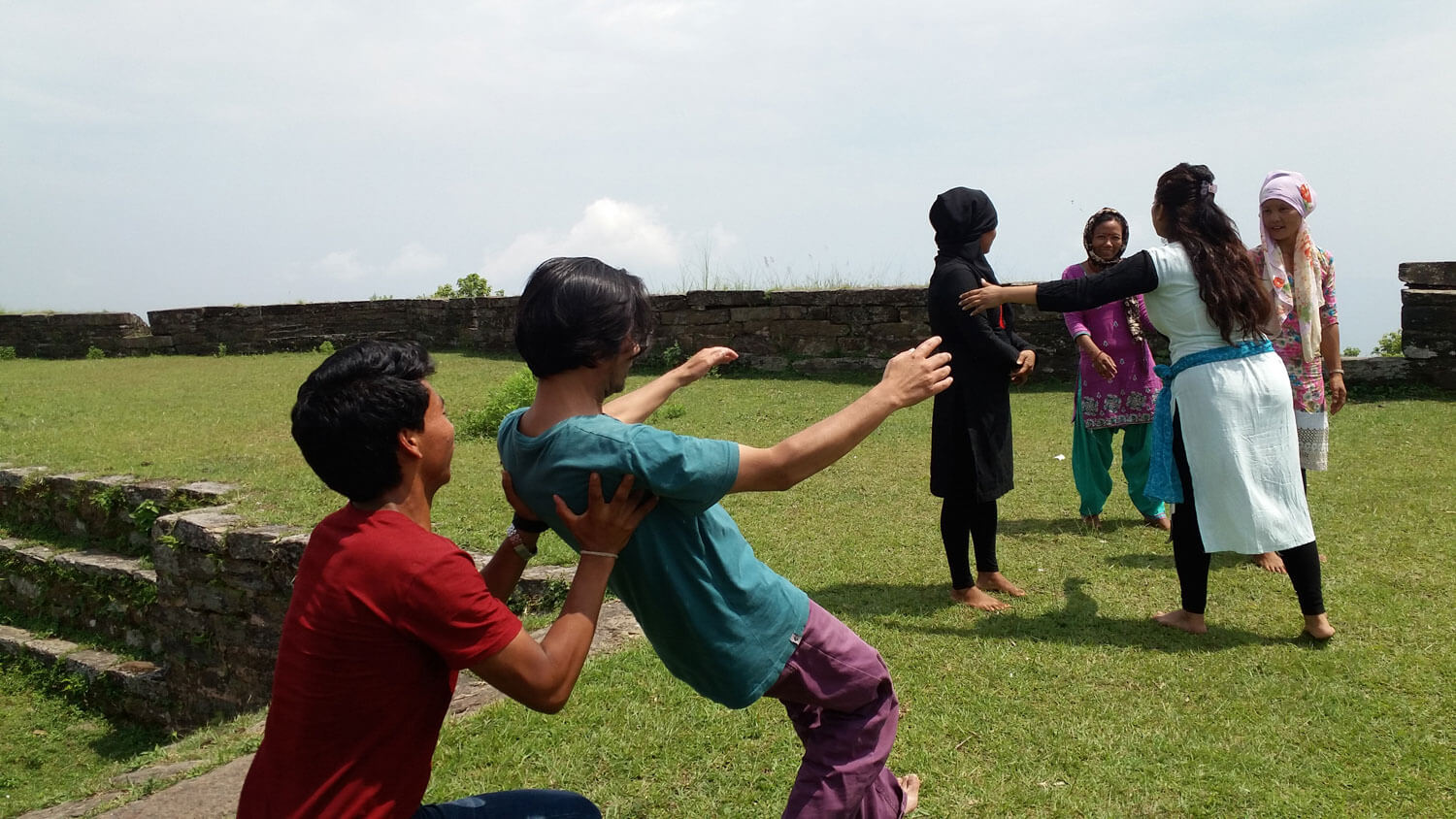Our 2017 Program
Everything we did that was a success led to the next challenge. We had increased enrollment by creating the lunch program. We needed more teachers as the teachers were overwhelmed so we hired them ourselves.
Then we found the students wanted to continue so each year we created a new grade of middle school. We then had students wanting to attend high school and for many it was too far to walk there and back each day we started the scholarship program to allow students to live during the school week at the school. The one issue we kept coming back to was that there were still too many children failing. We realized that the teachers all cared, but they had very little real training.
Many had graduated just out of high school and there was a need for teaching skills. Ramjee Adhikari, the head of Manswewa Ashram which we supported for his amazing work with homeless people volunteered to do the training. We invited the teachers to attend at the Uperdang Gadi school and paid them to attend and housed and fed them. It was an amazing success and here is the report. I want to thank Mary Jane and Buck Jones for their support which made this training a success.
Teachers’ Training was conducted in Upardang Gadi from May 26 – 28, 2017. A total of 16 participants from 11 schools, and a farmers’ group attended the program. Ramji Adhikari, Rupa KC and Srijana Oli from ManavSewa Ashram, Prem Thapa and Rupendra Karmacharya conducted the training on motivation, team building, teaching methodology, and geography and biodiversity of Nepal. Training was executed incorporating various activities: games (indoor and outdoor), yoga and meditation, poster presentation (maps, charts), visual (documentary show on laptop), and field visit (bird watching in nearby forest). All the participants actively involved in the training. On the evening, cultural dance program was organized by the Women Group of Gadi to entertain participants and the trainers.
Program Objectives
This program intends to train teachers for effective teaching practices. Specific objectives are:
- to provide effective way of teaching methods
- to share their experiences so that everyone learn from other’s experience
- to motivate participants incorporating different games, visuals, and posters
- to provide idea about practical learning method taking them to field visit.
Activities: Day 1 (May 26, 2017)
On behalf of Global Action Coalition, Rupendra Karmacharya welcomed all the participants. He explained the objectives of the training: to provide teachers the idea and motivation of effective teaching practices. Rather than conventional approach, creative way of teaching methods incorporating interesting games, activities and field visit would be effective. He also emphasized that idea and skills gained from this program would also be shared to their peers and colleagues so that others also get benefitted.
Rupa KC began the introductory session with simple game. A piece of paper with word on it was glued on the forehead of each participant. Each word has its related related/paired/opposite word like: in-out, charger-mobile etc. Participant had to find his/her partner with related word. They introduced each other. Each couple came forward in turn and introduced his/her partner.
Srijana Oli initiated three games: Freedom, Janai and Conflict. After playing these three games, Srijana asked the participants what lessons they learned from these games. Each participant explained their perspective about the games. Problem looks like very difficult initially but if you use your consciousness and thought you can solve the problem easily. Srijana said, “If there is problem there should be solution, if there is no solution for the problem that is not problem.” This is the lesson learned from Freedom game. Janai game is about human nature that people only think about themselves and do not care much about people around them. Conflict game indicates general nature of people that they point out others or give command others because it is easy to do so rather than doing themselves.
After the tea break, Prem Thapa discussed on Preparation Before Class. He elaborated on various sub-topics: teacher should be idol, subject matter should be learned properly and lesson planning. He emphasized that teachers should know their students well such that they could devise the lesson plan accordingly.
Rupendra Karmacharya informed participants about about the importance of field excursions for the students. They not only enjoy these field visits, but also get the first hand information. This training intends to take the participants for bird watching so that they learn practical idea such that they would also organize the field visit for their students. Nepal is rich on biodiversity because of its geographical variations. Rupendra discussed about formation of Himalaya, and physical features and climate of Nepal with presentation of maps and charts.
After the dinner, documentary on ‘Wonderful Facts about Himalaya – Revealed by Geologist’ was shown on laptop.
Day 2 (May 27, 2017)
Ramji Adhikari conducted the session on Motivation introducing three letters: SMS. S stands for straight. Sitting posture is very important because those who sit crooked position and look downwards, they might have mental problem. If you sit with your back bone and neck straight, flow of oxygen and blood on the body would be smooth. M stands of mind. Many people are suffering from mental problem and they have become addicted to sleeping tablets, drugs, alcohol and smoke. So mind management is important. Five senses (ear, eye, tongue, nose and skin) are mind food. What you hear in the morning has influence upon you during the whole day. S stands for smile. The flowers blossomed in the garden attract the attention of gardener. People with smile on their face attract the attention of God.
Ramji initiated the meditation informally called Pyat Pyate Meditation. He asked everyone to stand on their feet and to pat their face, head, neck, chest, stomach, legs by their both hands. He asked participants to do meditation on various mudra (posture): dhyan mudra, saraswoti mudra. “Know thyself is meditation”, he said.
He explained about VAK formula on teaching methodology. V – Visualization: to translate words into images. For example if you say garden, image of garden appears in your thought. A – Auditory: hear the sound in your imagination. Birds are chirping in the garden. K – Kinesthetic: to feel your presence in the garden.
After the lunch break, all the participants went to fort to ply games. Srijana and Rupa introduced four games: Make a circle, Jump in jump out, Hand to hand, and Balance. Whole group was divided into two teams and played these games. After these games, all came down to training hall. One of the members of each team presented what they learned from these games. Everyone feels that these games would be very enjoyable and effective for their students. First game gives the idea that things would generally simple but we make it complicated by not paying much attention and thought. Second game is about concentration and focus. Third game provides the lesson that we have to take initiation first to become successful. Fourth game emphasizes team work, strategy and balance. Balanced life leads to blissful life.
Ramji gave participants a task called 9 Dots Exercise (also called Life Changing Exercise or Mental Cage Exercise). Couple of participants could solve this task. The motive behind game is that you have to go beyond your limit or to take risks to achieve success in life.
After tea break, Prem conducted the session of Class Management discussing on introduction of lesson, presentation of lesson and review. He asked teachers to share their experience on teaching and class management. Each participant came forward and shared their experience. There are three ways to motivate students: love, greed (for example prize) and fact. Love is best way to motivate them. If you promise student, you have to fulfill that promise at any cost or it would backfire. Gita madam shared her experience with her own son. She promised to give him a mobile if he stands first in exam. He came first but she did not provide him mobile and he said that he would never come first again. So saying goes: Never take decision when you are angry and never promise when you are happy. Punishment is outdated tool that should not be practiced in school. Class arrangement would be generally same for years. Teachers should bring at least simple changes in class like change in bench arrangement that looks something different and brings excitement for students.
With the aid of charts and visual (pictures of endangered mammals, birds and reptiles of Nepal on laptop), Rupendra discussed about flora and fauna of Nepal, threats to wildlife and protection measures with establishment of protected areas. He also informed participants that bird watching tour in nearby forest had been planned for next morning.
Day 3 (May 28, 2017)
After the breakfast, Rupendra and Prem led the participants to bird watching tour to nearby forest. Rupendra asked participants to write the name of birds sighted, their number and location. They can write Nepali name of the birds. It was overclouded condition, so bird sighting was not good. Still some 21 bird species were sighted. Along with the birds, they observed useful trees, orchid flowers, butterflies. They discussed about all these. They also learned how to use binoculars. Rupendra informed them that they can take their students to this kind of field visits. Later they should be given simple assignment of recording 10 species of birds or 5 species of medicinal plants or10 different species of butterflies. They could write the simple description of these species if they could not know their name. This is effective way to make them appreciate nature and wildlife and involve them in conservation.
After the lunch, session began with reciting of national anthem. Srijana facilitated the session with the quotation: If iron gets soft it becomes equipment, if gold gets soft it becomes jewelry, if soil gets soft it becomes agricultural field, if flour gets soft it becomes bread and if human become soft, he/she would make home in others’ heart. Each person should wear armor of humbleness and jewelry of smile. Citing the life of Mother Teresa, Florence Nightingale, Buddha and Mahatma Gandi, she emphasized on Karma. Mother Teresa did not give birth but she became mother of all. Gandi became father of all Indians. It is all because of their Karma.
Srijana asked all participants to draw a figure of watch to play Appointment Game and the game was played. Morale of this game is that you have to manage time because time is limited and precious. If you are not planning well, you are planning to fail. After this paper game was played. This game is about perception: people have their own perception.
More games were played at the fort. First set of games was about bringing confidence upon yourselves and developing trust upon others. Other set of games was about skills and focus to meet the target. Participants really enjoyed these fun filled games.
After the tea break, Ramji began the session with a story. Chicks felt like to fly like eagle so they invited eagle to give the training on how to fly. Eagle accepted their invitation and explained everything how to fly. At the end of the training, eagle also provided them certificate. Chicks were so happy that they ran towards their home flashing the certificates and shouting, “We learned how to fly.” Citing this story, Ramji emphasized the practical way of learning. He expected some changes in a way of teaching, managing class and use the learning in their own life. He thanked Global Action Coalition for providing this opportunity to conduct the training in this historic place. He thanks all the trainers, participants and support staffs for their active participation.
On behalf of Global Action Coalition, Rupendra thanked all the trainers and participants for their sincere effort for this training. He felt like this is big family filled with love and respect for each other. He expressed his willingness to visit all the schools in near future. He had already visited some of the schools. He was hopeful the training would be instrumental for effective learning and teaching. He was hopeful that participants would also act like ambassadors to share their knowledge to their colleagues so that others would also get benefitted from them. He said that participants’ sincere review and feedback about this whole training that would be really helpful for organizers to devise and enhance future programs. He requested them to write their feedback and comment about the training.
On the evening, cultural dance program was organized by the Women Group of Gadi to entertain participants and the trainers. Along with the local people, the participants and trainers involved in this cultural activity. They all enjoyed singing and dancing.


